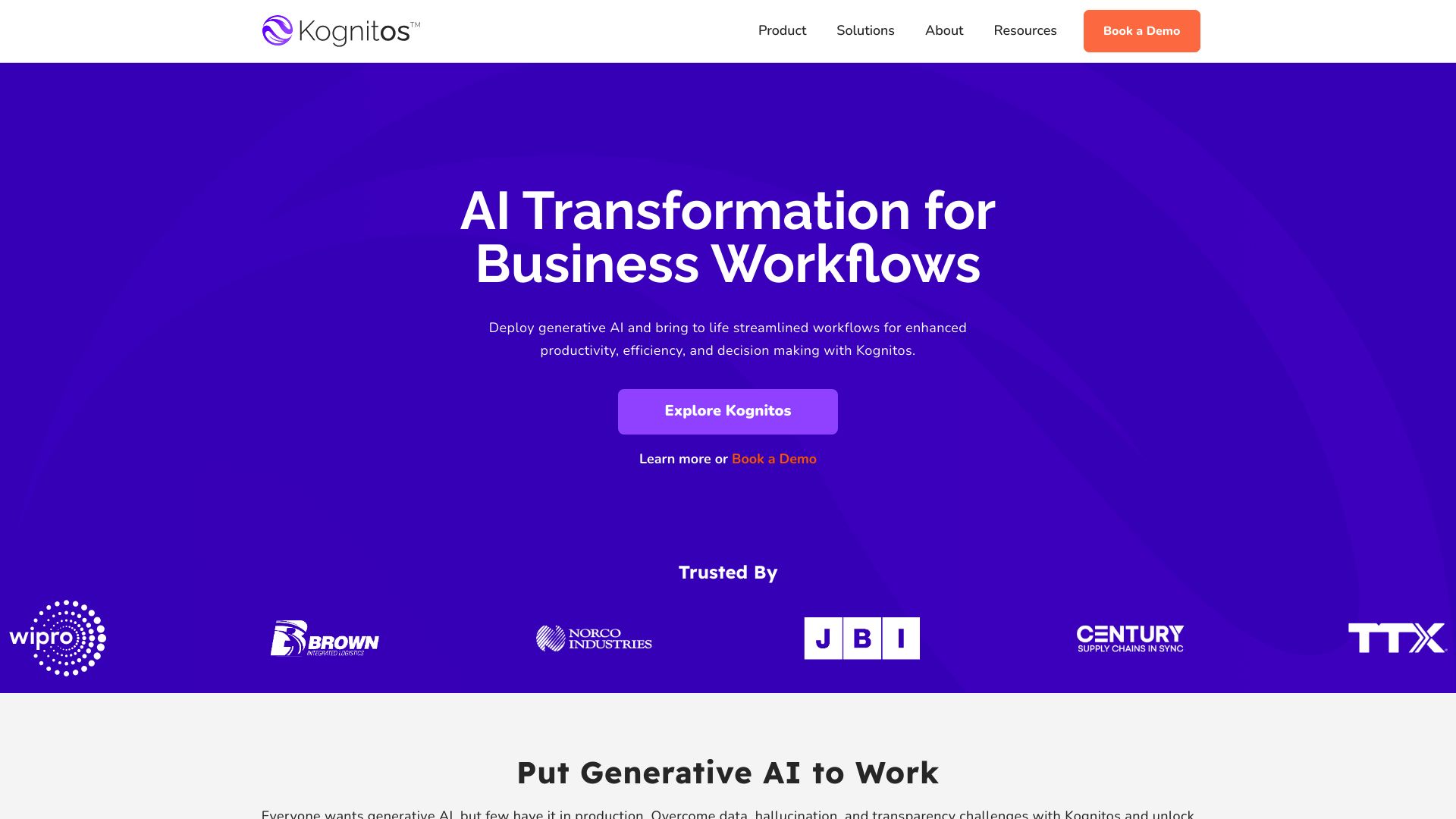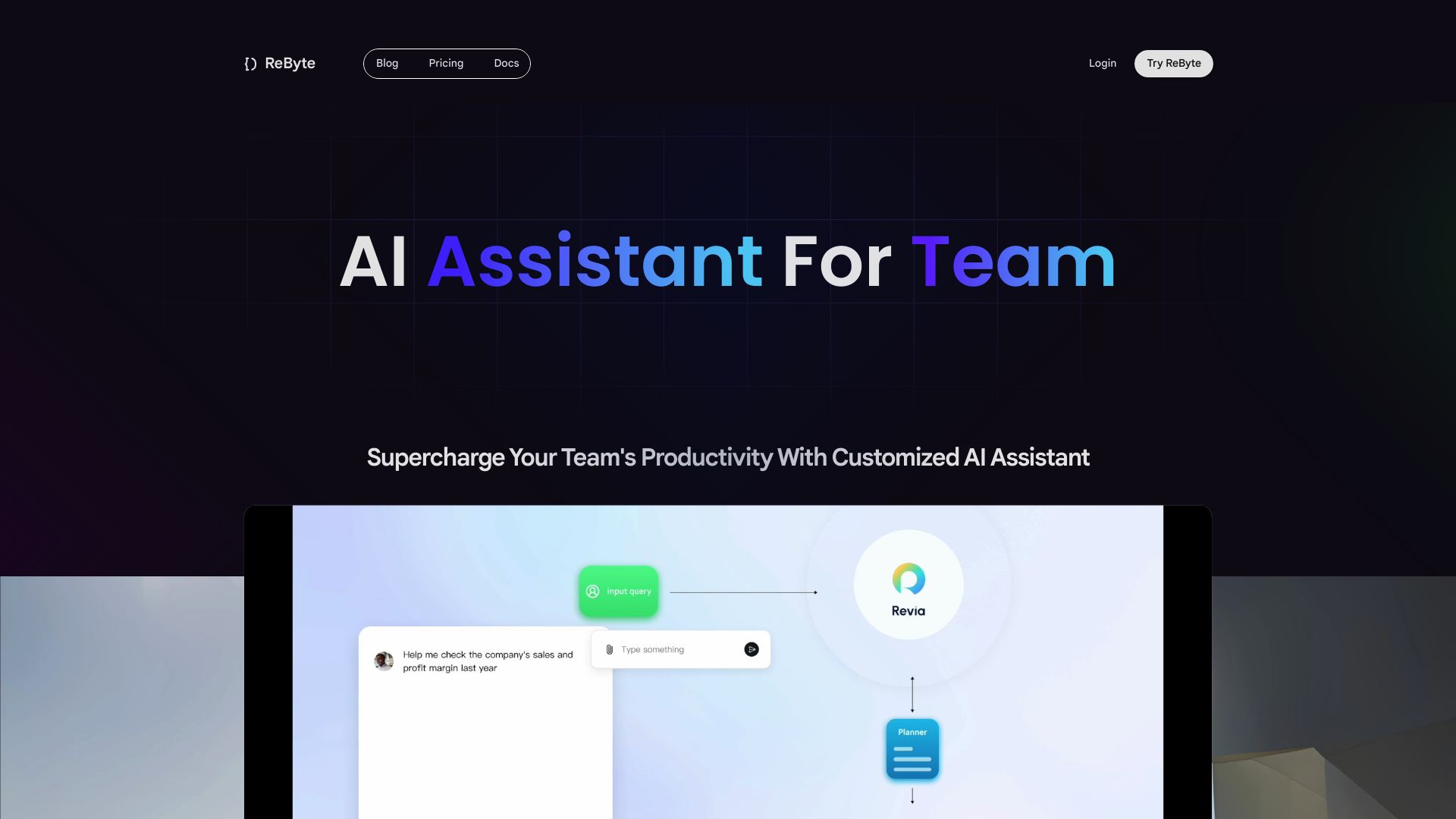Kognitos vs. Rebyte: Navigating AI Automation Platforms
AI-powered automation platforms transform business processes, but choosing the right solution can be daunting. This comparison of Kognitos vs. Rebyte, and SmythOS illuminates key features, strengths, and limitations of each platform. We explore how Kognitos leverages natural language processing for intuitive automation, Rebyte’s visual agent builder simplifies AI development, and SmythOS combines powerful features with unmatched flexibility.
Whether you’re a developer seeking advanced customization, a business leader focused on scalability, or a non-technical user looking for accessibility, this guide will help you navigate the AI automation landscape and select the tool that best fits your needs.
Kognitos Overview
Kognitos revolutionizes business automation through AI-powered natural language processing. Kognitos empowers users to automate complex processes using plain English, eliminating the need for traditional coding or bot management. This innovative approach democratizes automation, making it accessible to both technical and non-technical users across various industries.
Kognitos revolutionizes business automation through AI-powered natural language processing … empowers users to automate complex processes using plain English, eliminating the need for traditional coding or bot management.


The platform leverages generative AI and large language models to interpret user instructions, execute tasks, and handle exceptions autonomously. Kognitos excels in document processing, data manipulation, and seamless integration with third-party applications. Its self-learning capabilities allow the system to adapt and improve over time, reducing the need for constant human intervention.
The platform leverages generative AI and large language models to interpret user instructions, execute tasks, and handle exceptions autonomously.
Kognitos offers robust features for enterprise-level automation. The platform provides hosted environments for both development and production, allowing teams to collaborate effectively. Its system of record ensures transparency and auditability, documenting each step of the automation process. This feature proves invaluable for industries with strict compliance requirements.
While Kognitos excels in natural language automation, it lacks a visual drag-and-drop interface. This might present a learning curve for users accustomed to more traditional automation tools. Additionally, the platform’s focus on text-based interactions means it may not be ideal for projects requiring extensive multimodal capabilities.
Kognitos integrates smoothly with existing business systems through API connections. This flexibility allows organizations to enhance their current workflows without overhauling their entire tech stack. The platform’s cloud-based infrastructure ensures scalability, accommodating businesses of all sizes from small startups to large enterprises.
In the competitive landscape of AI-powered automation, Kognitos stands out for its natural language approach and enterprise-grade features. Its ability to handle complex business logic and edge cases through simple English instructions sets it apart from traditional robotic process automation tools. However, organizations requiring extensive visual programming or specialized AI model deployment might find the platform’s capabilities limiting in those specific areas.
Rebyte Overview
Rebyte empowers users to rapidly create AI-powered applications without extensive coding skills. The open-source platform features a visual agent builder for constructing complex AI agents using large language models. Users can design customized interfaces and integrate private data sources to tailor agents for specific needs.


The Rebyte platform manages the entire lifecycle of AI applications, from development to production deployment. Key capabilities include detailed observability into agent operations and a serverless runtime designed for scalability. This comprehensive approach allows teams to quickly prototype and launch AI solutions without wrestling with infrastructure complexities.
Rebyte empowers users to rapidly create AI-powered applications without extensive coding skills. The open-source platform features a visual agent builder for constructing complex AI agents…
Rebyte’s no-code tools and templates democratize AI development, enabling non-technical users to automate workflows and boost productivity. However, the platform lacks some advanced features like multimodal inputs or extensive debugging tools that more technical users might require. The focus on natural language interfaces also means visual programming options are limited compared to some competitors.
For organizations seeking to rapidly prototype and deploy AI agents, Rebyte offers an accessible entry point. Its emphasis on end-user programming through AI aligns well with the growing demand for tools that empower domain experts to create their own intelligent assistants. While not as feature-rich as some enterprise-grade platforms, Rebyte’s streamlined approach can accelerate AI adoption for many teams.
Feature Comparison
Kognitos and Rebyte offer distinct approaches to AI-powered automation, each with its own strengths and limitations. Kognitos excels in natural language processing, allowing users to automate complex processes using plain English instructions. This approach eliminates the need for traditional coding, making it accessible to both technical and non-technical users. Rebyte, on the other hand, provides a visual agent builder for constructing AI agents, appealing to those who prefer a more graphical interface for development.
In terms of core components, Kognitos demonstrates robust capabilities in autonomous agent operation, handling exceptions, and adapting to new scenarios through its self-learning capabilities. However, it lacks a visual drag-and-drop interface, which Rebyte offers. This limitation may present a steeper learning curve for users accustomed to more visual programming environments. Rebyte’s focus on rapid prototyping and deployment of AI agents through its no-code tools and templates gives it an edge in terms of accessibility for non-technical users.
Regarding security features, both platforms offer data encryption and integration capabilities with third-party applications. However, Kognitos appears to have a more comprehensive approach to enterprise-grade security, with its system of record ensuring transparency and auditability throughout the automation process. This feature is particularly valuable for industries with strict compliance requirements. Rebyte’s security offerings, while present, are not as prominently highlighted, potentially leaving some questions about its robustness in highly regulated environments.
Feature Comparison Table
| Kognitos | Rebyte | SmythOS | |
|---|---|---|---|
| CORE FEATURES | |||
| Visual Builder | ❌ | ✅ | ✅ |
| Autonomous Agents | ✅ | ❌ | ✅ |
| Multimodal | ✅ | ❌ | ✅ |
| Multi-Agent Collaboration | ✅ | ❌ | ✅ |
| SECURITY | |||
| Constrained Alignment | ❌ | ❌ | ✅ |
| Data Encryption | ✅ | ❌ | ✅ |
| OAuth | ✅ | ❌ | ✅ |
| IP Control | ❌ | ❌ | ✅ |
| COMPONENTS | |||
| Huggingface AIs | ✅ | ❌ | ✅ |
| Zapier APIs | ❌ | ✅ | ✅ |
| Classifiers | ✅ | ❌ | ✅ |
| Logic | ✅ | ❌ | ✅ |
| Data Lakes | ❌ | ❌ | ✅ |
| DEPLOYMENT OPTIONS (EMBODIMENTS) | |||
| Deploy as Webhook | ❌ | ❌ | ✅ |
| Staging Domains | ✅ | ❌ | ✅ |
| Production Domains | ✅ | ❌ | ✅ |
| API Authentication (OAuth + Key) | ✅ | ❌ | ✅ |
| Deploy as Site Chat | ❌ | ✅ | ✅ |
| Deploy as Scheduled Agent | ✅ | ❌ | ✅ |
| Deploy as GPT | ❌ | ✅ | ✅ |
| DATA LAKE SUPPORT | |||
| Hosted Vector Database | ❌ | ✅ | ✅ |
| Sitemap Crawler | ❌ | ❌ | ✅ |
| YouTube Transcript Crawler | ❌ | ❌ | ✅ |
| URL Crawler | ❌ | ❌ | ✅ |
Best Alternative to Kognitos and Rebyte
SmythOS stands out as the superior alternative to Kognitos and Rebyte, offering a comprehensive AI automation platform that combines power, flexibility, and ease of use. We’ve designed SmythOS to address the limitations of other platforms while providing a robust set of features that cater to a wide range of users and use cases.
Our drag-and-drop interface sets SmythOS apart, allowing users to build complex AI workflows without extensive coding knowledge. This visual approach to agent creation democratizes AI development, making it accessible to both technical and non-technical users. Unlike Kognitos, which relies heavily on natural language processing for automation, SmythOS provides a more intuitive and visual method for constructing AI agents.
SmythOS stands out as the superior alternative to Kognitos and Rebyte, offering a comprehensive AI automation platform that combines power, flexibility, and ease of use.
SmythOS excels in its extensive feature set, offering capabilities that outshine both Kognitos and Rebyte. Our platform supports autonomous agents, multimodal interactions, and multi-agent collaboration – features that are either limited or absent in the competing platforms. This comprehensive approach ensures that users can tackle a wide array of complex tasks and scenarios, from simple automation to sophisticated problem-solving applications.
Security and scalability are paramount in SmythOS. We’ve implemented robust security measures, including data encryption, OAuth integration, and IP control – features that are not fully addressed by Rebyte. Our platform is designed to grow with your needs, offering seamless scalability for enterprise-level deployments. This scalability, combined with our advanced integration capabilities, positions SmythOS as the ideal choice for businesses looking to future-proof their AI investments.
With SmythOS, we’ve created a platform that not only matches but exceeds the capabilities of Kognitos and Rebyte. Our commitment to continuous innovation and user-centric design ensures that SmythOS remains at the forefront of AI agent development, providing users with the tools they need to drive efficiency, innovation, and growth in their organizations.
Conclusion
Kognitos and Rebyte offer innovative approaches to AI-powered automation, each with distinct strengths. Kognitos excels in natural language processing, enabling users to automate complex processes using plain English. This accessibility democratizes automation across various industries. Rebyte’s visual agent builder and rapid prototyping capabilities make it an attractive option for teams seeking to quickly develop and deploy AI applications.
SmythOS, however, stands out as the superior choice, combining the best of both worlds and expanding on them. Our platform offers an intuitive drag-and-drop interface, extensive integrations, and support for multiple AI models. SmythOS empowers users to create sophisticated multi-agent systems, deploy them across various platforms, and scale effortlessly. The versatility of SmythOS, from chatbots to APIs, makes it adaptable to diverse business needs.
For organizations looking to harness the full potential of AI automation, SmythOS provides unparalleled flexibility, power, and ease of use. Explore our diverse range of AI-powered agent templates to jumpstart your automation journey. Create a free SmythOS account today and experience the future of AI workforce automation with unlimited agents and a 30-day money-back guarantee. Deploy SmythOS Agents Anywhere and revolutionize your workflow across multiple channels and platforms.
Last updated:
Disclaimer: The information presented in this article is for general informational purposes only and is provided as is. While we strive to keep the content up-to-date and accurate, we make no representations or warranties of any kind, express or implied, about the completeness, accuracy, reliability, suitability, or availability of the information contained in this article.
Any reliance you place on such information is strictly at your own risk. We reserve the right to make additions, deletions, or modifications to the contents of this article at any time without prior notice.
In no event will we be liable for any loss or damage including without limitation, indirect or consequential loss or damage, or any loss or damage whatsoever arising from loss of data, profits, or any other loss not specified herein arising out of, or in connection with, the use of this article.
Despite our best efforts, this article may contain oversights, errors, or omissions. If you notice any inaccuracies or have concerns about the content, please report them through our content feedback form. Your input helps us maintain the quality and reliability of our information.
